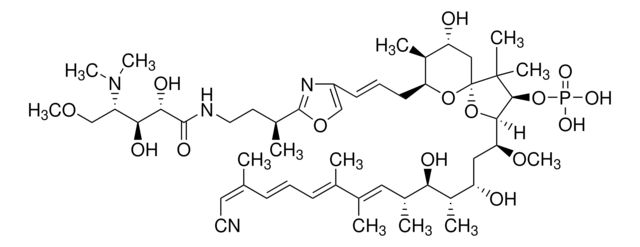All Photos(2)
About This Item
Empirical Formula (Hill Notation):
C8H8O4
CAS Number:
Molecular Weight:
168.15
MDL number:
UNSPSC Code:
12352202
PubChem Substance ID:
NACRES:
NA.77
Recommended Products
form
solid
SMILES string
O=C1OC(=O)C2C3CCC(O3)C12
InChI
1S/C8H8O4/c9-7-5-3-1-2-4(11-3)6(5)8(10)12-7/h3-6H,1-2H2
InChI key
JAABVEXCGCXWRR-UHFFFAOYSA-N
Gene Information
human ... PPP2R5A(5525)
General description
Norcantharidin (NCTD) is a demethylated derivative of cantharidin (CTD).
Application
Norcantharidin has been used in primary cell culture and treatment. It has also been used to treat mice inoculated with Huh7 cells subcutaneously.
Biochem/physiol Actions
Norcantharidin is a potential antitumor agent. Norcantharidin helps to block SK-N-SH neuroblastoma cell growth by stimulating autophagy and apoptosis.
Storage Class
11 - Combustible Solids
wgk_germany
WGK 3
flash_point_f
Not applicable
flash_point_c
Not applicable
ppe
Eyeshields, Gloves, type N95 (US)
Certificates of Analysis (COA)
Search for Certificates of Analysis (COA) by entering the products Lot/Batch Number. Lot and Batch Numbers can be found on a product’s label following the words ‘Lot’ or ‘Batch’.
Already Own This Product?
Find documentation for the products that you have recently purchased in the Document Library.
Customers Also Viewed
Chao-Bin Yeh et al.
PloS one, 7(2), e31055-e31055 (2012-03-01)
The rate of morbidity and mortality of hepatocellular carcinoma (HCC) in Taiwan has not lessened because of difficulty in treating tumor metastasis. Norcantharidin (NCTD) is currently used as an anticancer drug for hepatoma, breast cancer, and colorectal adenocarcinoma. NCTD possesses
C Y Hong et al.
Biochemical and biophysical research communications, 276(1), 278-285 (2000-09-28)
Norcantharidin (NCTD), a synthetic analogue of phosphatase type 2A inhibitors, cantharidin, was shown to have limited effects in treating human and animal tumors. The tumor cell killing mechanisms by norcantharidin, however, remain unclear. In this report, we wished to investigate
Norcantharidin modulates the miR-30a/Metadherin/AKT signaling axis to suppress proliferation and metastasis of stromal tumor cells in giant cell tumor of bone
Chen F, et al.
Biomedicine and Pharmacotherapy, 103, 1092-1100 (2018)
Rebekah E Wharton et al.
Toxins, 11(12) (2019-12-19)
Microcystins (MC) and nodularin (NOD) are toxins released by cyanobacteria during harmful algal blooms. They are potent inhibitors of protein phosphatases 1 and 2A (PP1 and PP2A) and cause a variety of adverse symptoms in humans and animals if ingested.
Norcantharidin inhibits SK-N-SH neuroblastoma cell growth by induction of autophagy and apoptosis
Han Z, et al.
Technology in Cancer Research & Treatment, 16(1), 33-44 (2017)
Our team of scientists has experience in all areas of research including Life Science, Material Science, Chemical Synthesis, Chromatography, Analytical and many others.
Contact Technical Service









